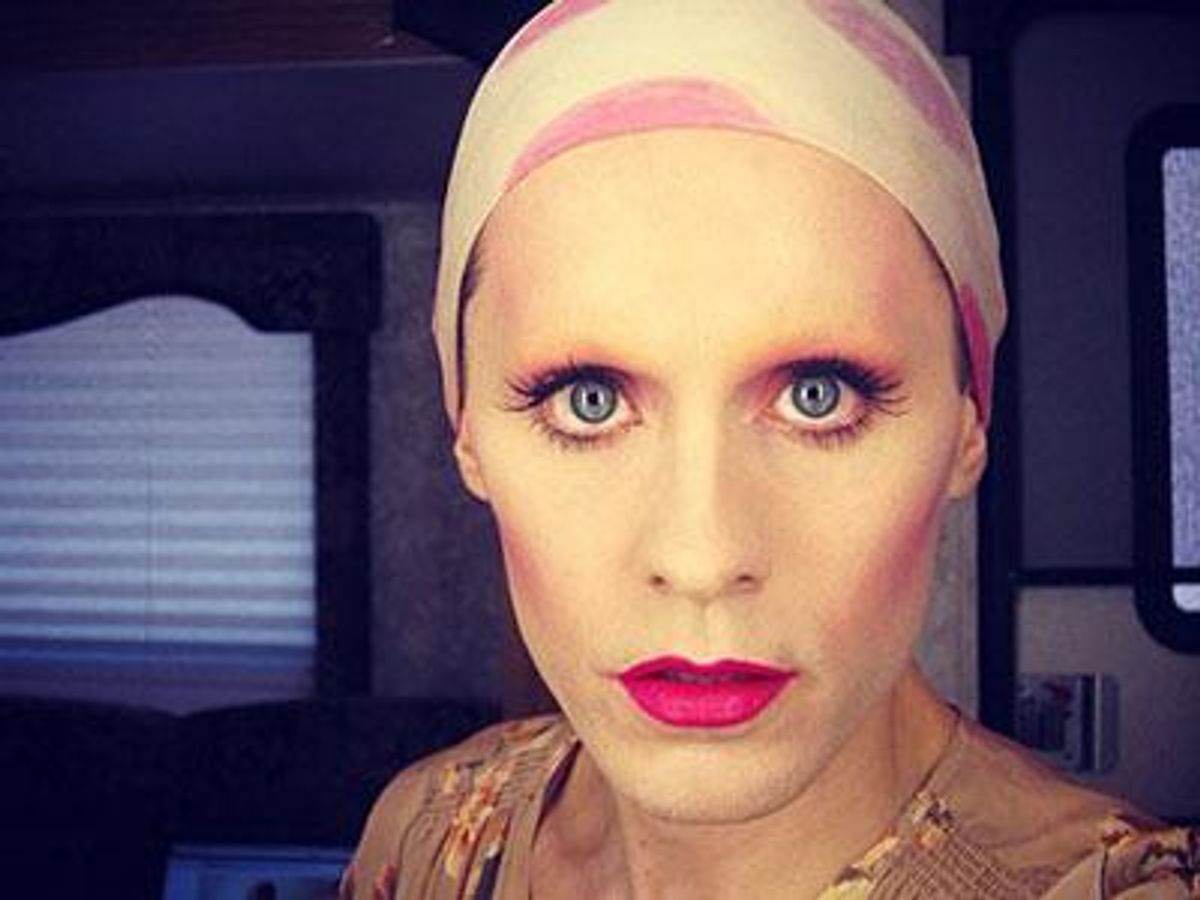All Rights reserved
By continuing to use our site, you agree to our Private Policy and Terms of Use.
Jared Leto is everywhere right now after winning raves for his performance in Dallas Buyers Club. In the film, Leto plays Rayon, a transgender woman who befriends Matthew McConaughey's Ron Woodroof, a homophobe stricken with HIV. Leto hasn't appeared in a movie in six years (and has been in just a handful over the past decade), and it was Rayon herself that drew him out of partial retirement to star in the film. For Leto, it was "the role of a lifetime," a part he connected with so deeply that he stayed in character throughout filming. In an interview with Moviefone, the actor discussed going to Whole Foods as Rayon and the looks he got from customers. They ranged from "Who is that?" to "What is that?"
However, like those organic shoppers, the media hasn't much clue what to do with Rayon. Last month, while sitting down with The Daily Beast, the outlet asked Leto what it was like to release his "inner tranny," baiting Leto into using the hate-filled slur. This would be like asking Sean Penn about playing "f****t" in Gus Van Sant's Milk, which no one would ever do. It would cause a media firestorm. The Daily Beast quietly apologized and changed the language in the interview, but many other outlets have continued to use the offensive word to highlight Leto's astonishing physical transformation. None have taken it down.
Trending stories
Elsewhere, no one can seem to decide what words to use to describe Leto's character either. She's been called a "transsexual," a "transsexual man," a "transvestite," a "transvestite man," and a "drag queen."
Jared Leto has been clear that Rayon, who is a "fictional composite character," is someone who wanted to live her life as a woman. Although the characters in the film commonly misgender Rayon -- referring to her as "he" -- Leto's pronouns and language choice have been mostly respectful. (He uses the t word in the Moviefone chat, but I'll give him the very slight benefit of a doubt -- as the word reads like it should have air quotes around it.) In interviews, Leto has consistently insisted that Rayon is "transgender." This is a term that is used to indicate that someone identifies with the opposite gender that they were assigned at birth.
This is quite different than a transvestite or a drag queen, someone who dresses up in women's clothing for entertainment or pleasure. The term "transvestite" is somewhat outdated and usually pejorative, similar to "cross-dresser." Drag is a job, not an identity. Being transgender is who you are.
As far as "transgender" versus "transsexual" goes, each is a personal preference based on the individual. "Transgender" is more common these days, especially among younger transitioners. This indicates a generational evolution on our understandings of sexuality and orientation. However, I know women who proudly call themselves "transsexual." If you're not sure, "trans*" is a happy medium between the two, the asterisk representing the spectrum of trans identities and ways people can identify.
I consider myself an ally to transgender people, and when I don't know the correct terminology or what someone's preference is, I ask. However, I find it strange that reporters, who make their living by asking questions, can't think of that most basic one when covering trans people. Being cisgender, I realize I have a lot to learn, and the media needs to do the same here.
Rayon is far from the first example of the media getting it wrong when it comes to transgender folks. This happens all the time, but we usually don't have an A-list actor to draw attention to it. Back in 2008, Perez Hilton referred to actress Laverne Cox, who identifies as transgender, as a "tranny" three times in an article about her. No one raised much of a fuss. Five years later, now that Cox is the breakout star of Orange Is the New Black, people are still getting it wrong.
She's not alone. When trans women are murdered, newspapers commonly misgender them. The Advocate recently reported that the New Jersey Star-Ledger used 26-year-old Eyricka Morgan's birth name in coverage of her death by stabbing, referring to her by male pronouns. The newspaper corrected the mistake in follow-up reports but didn't alter the originals.
The Star-Ledger is one of hundreds of cases. When Chelsea Manning came out as transgender, outlets including MSNBC, NPR, Reuters, the BBC, and CNN struggled to get their transgender coverage up to speed. CNN defended its right to misgender Chelsea Manning, stating that it would officially change its policy when Manning "legally changed his name."
However, during an interview with Meat Loaf (ne Marvin Lee Aday), Today host Matt Lauer once referred to him as "Meat." It sounds awkward, but Lauer was just trying to be respectful to the singer's chosen name. Were Meat Loaf to appear on CNN or MSNBC, he would be given largely the same treatment. I find it sad that a man who renamed himself after a lump of dead cow gets more respect than transgender women.
As a cisgender man playing a trans woman, Jared Leto has the ability to impact that culture. An editorial in the Los Angeles Times recently argued that Leto's part should have gone to a transgender actress, and while I wholeheartedly agree, I think there's room for Leto to be a strong ally in the fight for respect. Leto has said he didn't want the character to become a "caricature," instead giving people the opportunity to know Rayon the way he did.
Cisgender people will never be able to inhabit her skin, but the least we can do is try to understand her better. Jared Leto can do that by standing up against misgendering and poor language choices and help change the conversation.
Leto might have landed the role of a lifetime, but his real work is just beginning.
NICO LANG is a correspondent and blogger for WBEZ (Chicago's NPR affiliate), the cocreator of In Our Words, and a graduate student in DePaul University's Media & Cinema Studies program. He writes about LGBTQ issues in Chicago and contributes to theLos Angeles Times, Thought Catalog,andThe Huffington Post.


















































































